

 The South African
The South African
The Queen’s South Africa (QSA) and King’s South Africa (KSA) medals were awarded to participants in the Boer War. However, it was the practice that no coloureds were to receive either of these two medals. The white members of the O’okiep garrison, together with the relieving force, were entitled to a Queen’s South Africa Medal. O’okiep garrison were not to receive the Queen’s South Africa medal. So the Cape Copper Company decided to issue its own medals for presentation to all the defenders regardless of race. It seems probable that the company decided to award the silver medals to officers and senior officials of the mine and bronze to other ranks. This is the story of what is probably the unique award of a silver and a bronze medal to a father and son.
The mine at O’okiep had been in operation since 1855 and was considered to be one of the richest copper mines in the world. The population of O’okiep in April 1902 was about 4000, of which 400 were white. The defending force was a total of 922 officers and men, of which the Namaqualand Town Guard comprised 660 coloureds and 206 white miners. The only other defenders were 44 men of the 5th Warwickshire Militia and 12 officers and men of the Cape Garrison Artillery.
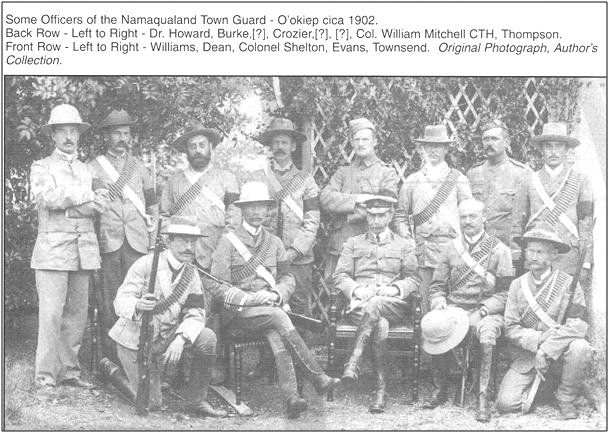
Some officers of the Namaqualand Town Guard
William
Townsend is at far right in the front row
The defence of O’okiep ran from 4 April
to 4 May 1902. The wording on the reverse
of the Cape Copper Company medal
occupied 13 lines:
“Presented to the Officers,
Non-Commissioned Officers and
Men of the Garrison of O’okiep in
recognition of their gallant defence of the
town under Lt. Col. Shelton D.S.O. against
a greatly superior force of Boers April 4th to
May 4th 1902”
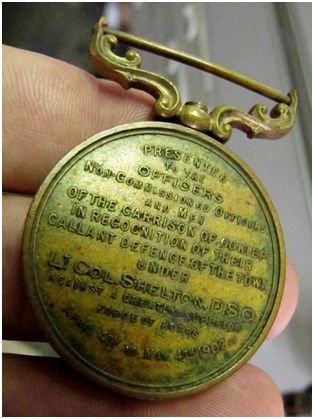
The reverse of the medal
The father and son were William Webster Townsend 1845-1924, and Victor Robert Townsend 1887-1960.
William Webster Townsend
William was born in 1845 at Mowbray, Cape Town. His father was John, born in Kent, England, and mother, Elizabeth Bauman, who were married in Cape Town in 1826. John Townsend moved to Namaqualand in 1852 as Manager of the Spektakel Copper Mine.
After the death of his first wife in 1846 John remarried twice, and by his three wives fathered no fewer than 24 children. He died in 1875 and is buried in the cemetery at Springbok.
William was employed as the Chief Cashier of the Cape Copper Company at O’okiep in Namaqualand.
He served with the Namaqualand Town Guard during the Boer War 1899-1902. He was commissioned as a Captain on 22 January 1901 (confirmed Cape Colony Field Order 435 dated 13 January 1901). The Town Guard was employed to man the defence works at O'okiep and Nababeep, and for many months carried out piquet, guard, escort and other duties. He commanded No. 3 Position both before and during the siege. For thirty days from 4 April 1902 they successfully defended the town of O’okiep against Boer forces under Smuts, van Deventer and Maritz. The war and the siege of O‘okiep ended with the Peace of Vereeniging on 31 May 1902.
Many coloured men of mixed race also served in the Town Guard. Their names do appear on the QSA medal roll but are ruled through and no QSA was issued to them. The records of the Cape Copper Company have long since been destroyed, and the reason for the issue of the medal in both silver and bronze is not known. One thought is that only the senior officials of the company who were officers in the Town Guard received the silver medal. However two of the ten known silver medals given to Borchards and Howard were named to the Cape Garrison Artillery and the Namaqualand Border Scouts. Colonel Shelton, O.C. of the Town Guard did not receive the medal.
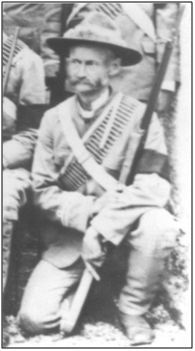
William Webster Townsend
William had three sons serving in the Namaqualand Town Guard. The eldest was 115 Sgt William Frederick Worcester Townsend who seldom used the name Frederick, and he appears on the medal roll as W W Townsend. He was slightly wounded defending Fort Shelton on 22 April 1902.(1) The next was Corporal James Nolloth Townsend born on 3 July 1877 who was employed on outpost duty prior to discharge. His QSA was issued as 655 Transport Sergeant John N Townsend with the Namaqualand Border Scouts.(2) The youngest was 868 Private Victor Robert Townsend, the second subject of this article, who also served in WWI when he was awarded the M.S.M. (Meritorious Service Medal) and later in WWII. There was a fourth son Frank William Townsend (1889-1951) who was too young to serve at O’okiep, but did serve with the 2nd Infantry (Duke of Edinburgh’s Own Rifles) during WWI in German South West Africa 191415 and in German East Africa 1915-17 with the 9th S.A. Infantry.
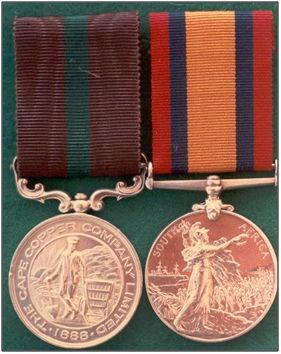
QSA, no clasp, Capt. Namqlnd. T.G.,
Cape Copper Company medal in silver
Named W.W. Townsend
Brian Keiran in his book on the Defence and Relief of O’okiep, indicates seventeen presumed recipients of a silver medal, of which only ten medals are known to exist. The ten men were J Crosier, A Borcherds, J Burrows, A E Gyngell, R N Howard, C A Jones, H Rodda, P Thompsen, W W Townsend and H Willman. The surnames of only two of these recipients of silver medals appear again amongst the surnames of other ranks who received the bronze medal. These were Jones and Rodda, so further research is required to establish whether there is any father and son connection. Of these ten silver Cape Copper Company medals, the Townsend’s may be the only father and son to receive both a silver and a bronze medal. These two groups formed part of the author’s medal collection for forty years.
William retired from the Company in 1919 and died at Cape Town on 11 November 1924. His grave is in the Maitland Cemetery, Cape Town(3), with his third wife Rhoda (Kearns) born on 20 January 1859, died 8 April 1945. William Webster Townsend had six daughters in addition to his four sons previously mentioned.
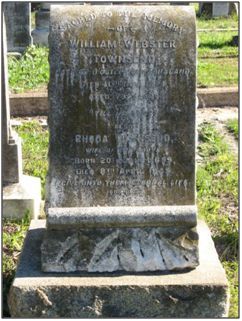
William’s headstone
The following is taken from the 32 page booklet entitled “1885-1985 100th Anniversary Celebration Souvenir of the Phoenix Lodge of Namaqualand Springbok”
Townsend had a lifetime of membership of units of the Grand Lodge of England. He was initiated in the Namaqua Lodge No.1023 by his father the Worshipful Master in 1866. This Lodge ceased to exist by 1870. The Phoenix Lodge of Namaqualand was inaugurated in 1885. William was one of fifteen Foundation Members and served as the Secretary and Treasurer, and by 18 November 1886 he had advanced to the position of Worshipful Master. In the list of Installing Masters his name appears for 1892, 1903, 1906, 1907, 1909, 1912, 1913, 1914, 1917, 1919. At Grand Lodge District level William served as Senior Grand Warden 1903, Grand Registrar 1899, Grand Standard Bearer 1898, Grand Pursuivant 1887, and Grand Lodge Steward 1886.
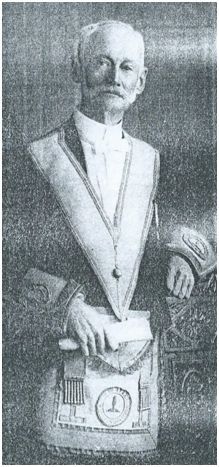
Townsend in ceremonial robes
of the Phoenix Lodge
In 1919 William was presented with an illuminated address and a cheque conveying the appreciation of the Lodge for the many years of distinguished service and affection and esteem in which he was held by all brethren. The mine was closed in 1919 and presumably William then left Namaqualand to seek employment elsewhere, so this illuminated address was presented upon his leaving the Lodge after 34 years.
Interestingly the names of the following known recipients of the Cape Copper Company medal in silver also appear as office bearers of the Phoenix Lodge – H G S Willman, P Thompson, J Burrows and Dr R N Howard.
Much information about W W Townsend was obtained from a family member.
Now for the story of Williams Webster’s third son, Victor Robert Townsend.
Victor Robert Townsend
Victor Robert Townsend was a boy of only 14 years of age when he earned his QSA and Cape Copper Company medal in bronze in the defence of O'okiep in April 1902. He must have been one of the youngest recipients of the QSA, and his service may be compared to those boys of the Mafeking Cadet Corps under Baden- Powell in that other famous siege.
Victor was born in Namaqualand on 15 May 1887. He served in the Namaqualand Town Guard in the Boer War. The Town Guard was employed to man the defence works at O'okiep and Nababeep, for many months carrying out piquet, guard, escort and other duties. For 30 days however, from 4 April 1902 they successfully defended the town against Boer forces under Smuts, van Deventer and Maritz. The war and the siege of O'okiep ended with the Peace of Vereeniging on 31 May 1902.
In World War I Victor served as a Private in Brand's Free State Rifles in German South West Africa from 22 October 1914 until 4 July 1915. He then re-attested on 31 January 1916 for service with the S.A. Motor Cycle Corps in German East Africa. He was promoted Company Sergeant Major on 5 August 1918, and released from service on 12 February 1919.
At some stage in German East Africa he was a prisoner of war, as a note with his papers reads: “To O.C. German Forces. Will you be so kind as to give Cpl Townsend medical treatment, or have him sent into our Forces. You have the name of looking after all prisoners very well. Kind regards. Why don’t you chuck up the war here as it is only a waste of money and lives; take my tip and chuck it up.” The signature is unknown.
Awarded the Meritorious Service Medal
in the London Gazette of 3 June 1919
(page. 6970). The recommendation dated
4 December 1918 is signed by Major
Duncan McMillan, Commanding the
S.A.M.C.C, and reads:
“For general good work over 2½ years
in the field. His patrol work has been
fearless and his information reliable”.
His M.S.M. is one of only 308 awarded to South Africans in World War I, of which 184 were awarded for German East Africa, seven to the S.A.M.C.C.
He again attested at Johannesburg 5 November 1940 for service with the 4th Battalion of 1st Reserve Brigade. Being older than the military service age limit of 45 years, he gave his year of birth incorrectly as 1895. For a period he served in the 8th (P.O.W.) Battalion at Zonderwater P.O.W. Camp. He was promoted to Lance Corporal on 26 April 1940, to Corporal 15 December 1940, Sergeant 1 August 1941, and Acting C.S.M. on 4 November 1941. Victor was discharged at Pretoria on 19 January 1945.
In civilian life he was a farmer, and later was on the staff of the College of Agriculture at Potchefstroom, and finally as a Housemaster at Glen Agricultural College in the F.S., from where he retired in 1947. He died at Durban on 27 May 1960.
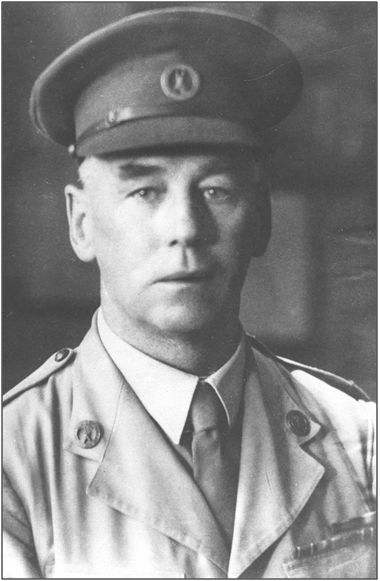
Victor Robert Townsend
References
Kieran, B L O'okiep The Defence and Relief of O'okiep Cape Colony 4 April to 4 May 1902, 1995, Brian Kieran, Hong Kong.
Hibbard, M G Boer War Tribute Medals 1982, Constantia Classic Publications
SANDF DocumentationCentre
Individual Service files
Queen's South Africa Medal Rolls WO 100
Notes: (1) (Deceased Estate file Cape Town MOOC 6/9/16317 ref 4153/49). (2) (Deceased Estate file Cape Town MOOC 6/9/24479 ref 795/58). (3) (ref 21278A)
Inside front cover colour photograph:

Victor’s medal group with the exact naming -
(Queen’s SA Medal, no specific battle, for
service in the Namaqualand Town Guard)
[GV = obverse was of King George V]
(WWII service medals and Meritorious Service medal for service in the SAMCC in
German East Africa as acting company sergeant major also at Zonderwater POW camp)
Return to Journal Index OR Society's Home page
South African Military History Society / scribe@samilitaryhistory.org